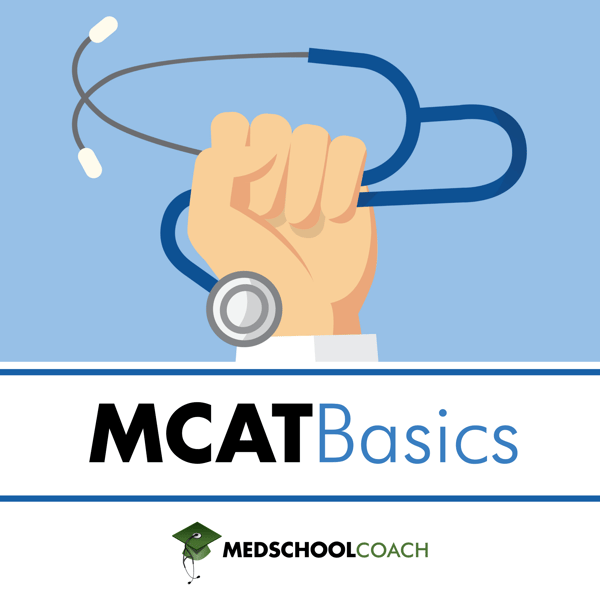Enzyme Kinetics, Inhibition, and Categorization
MCAT Basics (from MedSchoolCoach)
MedSchoolCoach
4.6 • 612 Ratings
🗓️ 12 November 2024
⏱️ 44 minutes
🧾️ Download transcript
Summary
In this episode, we explore enzyme kinetics and inhibition, key concepts for the MCAT Bio/Biochem section. We’ll cover how enzymes accelerate biological reactions by lowering activation energy and introduce two models for enzyme-substrate interaction: the lock-and-key model and the induced fit model.
You'll learn how to apply the Michaelis-Menten equation, focusing on factors like Km and Vmax to understand enzyme efficiency and substrate binding. We’ll also break down the different types of enzyme inhibition—competitive, non-competitive, and uncompetitive—and their effects on enzyme activity. Finally, we discuss the six major types of enzymes and their roles in biological processes, with examples like ligases, isomerases, and hydrolases.
Visit MedSchoolCoach.com for more help with the MCAT.
Jump into the conversation:
(00:00) Introduction to enzyme kinetics and inhibition
(01:58) Definition of enzymes and their role
(03:50) Enzyme models: lock and key vs. induced fit
(06:28) Michaelis-Menten Equation
(10:53) Association and dissociation constants
(12:34) Kcat and catalytic efficiency
(14:43) Assumptions of Michaelis-Menten
(18:23) Lineweaver-Burk Plot: linearized Michaelis-Menten Equation
(21:09) Enzyme inhibition: reversible vs. irreversible
(22:14) Competitive inhibition: Km and Vmax
(24:46) Non-competitive inhibition: Effects on Km and Vmax
(27:20) Irreversible inhibition
(29:13) Allosteric inhibition
(31:26) Homotropic and feedback inhibition
(37:40) Common biological enzymes: dehydrogenase, synthetase, and kinase
(43:44) MCAT Advice of the Day
Transcript
Click on a timestamp to play from that location
| 0:00.0 | Welcome to MCAT Basics, your ultimate guide to the essential topics you need to master for the MCAT, |
| 0:06.2 | brought to you by the physicians at med school coach. Every week, Sam Smith breaks down high-yield |
| 0:11.5 | MCAT topics, ensuring you're primed for success on test day. Join Sam as we explore the most |
| 0:17.2 | crucial subjects outlined by the AAMC, pulled from official practice materials |
| 0:21.6 | and third-party resources. |
| 0:23.2 | Get ready to elevate your MCAT game with topics tailored to maximize your score potential. |
| 0:28.6 | Hello, I'm Sam Smith. |
| 0:31.2 | This podcast covers enzymes, and I'm going to cover kind of a wide variety of topics that deal with enzymes. |
| 0:40.1 | First is going to be enzyme kinetics. |
| 0:42.3 | And then I'm going to talk a little bit about enzyme inhibition. |
| 0:44.9 | I'm going to go over the basic types of enzymes and talk about classes of enzymes. |
| 0:51.6 | And then I'm going to talk a little bit about restriction enzymes. |
| 0:54.4 | What are they cut? |
| 0:55.2 | What are they useful for, et cetera. |
| 0:59.0 | So, yeah, I hope you enjoy. |
| 1:01.0 | I hope this is useful for your study. |
| 1:08.8 | All right, so let's begin with a brief definition of the term enzyme. |
| 1:14.6 | So an enzyme is a protein or sometimes RNA catalyst that accelerates biological reactions. |
| 1:21.6 | So enzymes act on substrates, which you can think of as reactants, to create some product. |
| 1:29.7 | And they make reactions faster by lowering the activation energy. |
| 1:34.8 | And if you've seen a reaction coordinate or the diagram of, as a reaction proceeds, you'll |
| 1:41.0 | see that this activation energy, you can think it's like a big hump and you can see |
... |
Please login to see the full transcript.
Disclaimer: The podcast and artwork embedded on this page are from MedSchoolCoach, and are the property of its owner and not affiliated with or endorsed by Tapesearch.
Generated transcripts are the property of MedSchoolCoach and are distributed freely under the Fair Use doctrine. Transcripts generated by Tapesearch are not guaranteed to be accurate.
Copyright © Tapesearch 2025.

